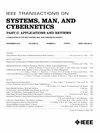Computational military tactical planning system
IEEE Transactions on Systems Man and Cybernetics Part C-Applications and Re
Pub Date : 2002-05-01
DOI:10.1109/TSMCC.2002.801352
引用次数: 55
Abstract
A computational system called fuzzy-genetic decision optimization combines two soft computing methods, genetic optimization and fuzzy ordinal preference, and a traditional hard computing method, stochastic system simulation, to tackle the difficult task of generating battle plans for military tactical forces. Planning for a tactical military battle is a complex, high-dimensional task which often bedevils experienced professionals. In fuzzy-genetic decision optimization, the military commander enters his battle outcome preferences into a user interface to generate a fuzzy ordinal preference model that scores his preference for any battle outcome. A genetic algorithm iteratively generates populations of battle plans for evaluation in a stochastic combat simulation. The fuzzy preference model converts the simulation results into a fitness value for each population member, allowing the genetic algorithm to generate the next population. Evolution continues until the system produces a final population of high-performance plans which achieve the commander's intent for the mission. Analysis of experimental results shows that co-evolution of friendly and enemy plans by competing genetic algorithms improves the performance of the planning system. If allowed to evolve long enough, the plans produced by automated algorithms had a significantly higher mean performance than those generated by experienced military experts.计算军事战术规划系统
为了解决军事战术部队作战计划生成的难题,模糊遗传决策优化计算系统将遗传优化和模糊顺序偏好两种软计算方法与传统的硬计算方法随机系统仿真相结合。战术军事战斗的规划是一项复杂的高维任务,经常困扰着经验丰富的专业人士。在模糊遗传决策优化中,军事指挥官将他的战斗结果偏好输入到用户界面中,生成一个模糊顺序偏好模型,该模型对他对任何战斗结果的偏好进行评分。在随机作战仿真中,采用遗传算法迭代生成作战计划种群以进行评估。模糊偏好模型将仿真结果转化为每个种群成员的适应度值,使遗传算法能够生成下一个种群。进化会持续下去,直到系统产生最终的高性能计划,达到指挥官对任务的意图。实验结果分析表明,通过竞争遗传算法对友敌计划进行协同进化,提高了规划系统的性能。如果允许进化足够长的时间,自动算法生成的计划的平均性能明显高于经验丰富的军事专家生成的计划。
本文章由计算机程序翻译,如有差异,请以英文原文为准。
求助全文
约1分钟内获得全文
求助全文
来源期刊
自引率
0.00%
发文量
1
审稿时长
3 months

 求助内容:
求助内容: 应助结果提醒方式:
应助结果提醒方式:


